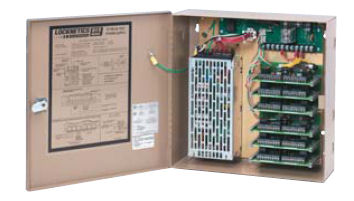Someone recently asked me whether a low voltage license is required for wiring electrified hardware in Massachusetts. I asked my Panel of Experts and did some research on the Mass.gov website, and (regardless of what actually happens out in the field on a daily basis) a license IS required for connecting wires to electrified hardware in Massachusetts (actually two licenses – read on).
Keep in mind that this information is related to Massachusetts only. Information for other states can be found by visiting the links near the bottom of this post.
In Massachusetts, the Board of State Examiners of Electricians issues the following types of electrician’s licenses:
 Master Electrician (Class A license)
Master Electrician (Class A license)
Journeyman Electrician (Class B license)
Systems Contractor (Class C license)
Systems Technician (Class D license)
At minimum, someone wiring electrified hardware must have a Class D, Systems Technician license. A Systems Technician is qualified to do the work of installing, repairing or maintaining wires, conduits, apparatus, devices, fixtures, or other appliances used for systems. The applicant for a Class D license must furnish proof of at least 4,000 hours of practical experience under the direct supervision of a licensed Systems Technician, as well as 300 hours of approved educational instruction, both within specified time periods. The applicant must also obtain a grade of at least 70% on all licensure examinations. You can find more information about licensure criteria at the Board of State Examiners of Electricians website.
A licensed (Class D) Systems Technician may apply for a Class C, Systems Contractor license after actively working as a licensed Systems Technician for one year and successfully completing (without substantial interruption and with the same provider) a minimum of 75 clock hours of classroom instruction on the appropriate electrical code. The applicant must also obtain a grade of at least 70% on all licensure examinations. The holder of a Class C license may employ licensed Systems Technicians and apprentices (one apprentice per technician maximum). A Class C license-holder may apply for permits to do electrical work; a Class D license-holder may not apply for permits.
In addition to one of the licenses listed above, anyone who wishes to engage in the business of installing, repairing, maintaining, or selling any Security Systems, CCTV/Surveillance Systems, Access Control Systems, or Door Entry Systems must obtain an S-license from the Department of Public Safety. The application process for an S-License includes a background check and references from 3 Massachusetts citizens verifying the reputation of the applicant. Only those with a valid electrician’s license may apply for an S-License. You can learn more about the S-License at the Department of Public Safety’s website.
If anyone has corrections or additions to this information, please leave a comment (by clicking here and scrolling down).
Links to additional information for other states:
The International Association of Electrical Inspectors
LicensedElectrician.com
Electric-Find.com
Contractors-License.org
MikeHolt.com
Thank you to my Panel of Experts: George Condon of Northeast Security Solutions, John Doherty of ENE Systems, and Paul Goldense of Goldense Building Products Inc.
You need to login or register to bookmark/favorite this content.






While I was working on this post, I sent an email to the Massachusetts Board of State Examiners of Electricians, and I asked whether a license was required to replace an existing electric strike and connect the plug connectors. I just received an answer of “YES.”
Do you need a state license to install a passive category 5e or 6 low voltage telecommunications wiring in the state of Massachusetts?
Hi Donald –
I’m sorry – I don’t know the answer to that one.
– Lori
So how does the local cable guy or Verizon tech do their job? Neither company has techs who hold class D licenses.
Hi Jeff –
I’m not sure what the requirements are for those technicians.
– Lori
It just seems to me that their jobs fit squarely into the definition of what the State is regulating, but I know for a fact that they don’t hold a class D license or it’s equivalent. Why are small/independents be held to the standard but not Comcast, VZ and the other big guys?
believe it or not those big company’s have either a supervisor or manager that holds the license, they just don’t tell the techs they have the license otherwise every tech would ask to get a low voltage license